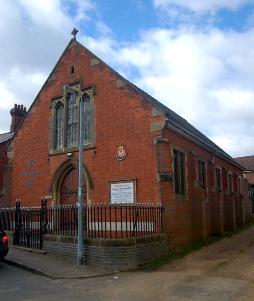Methodism in Potton

The former Methodist chapel March 2007
It was probably in the Market Place that John Wesley, the founder of Methodism, preached in 1742: when he came again in 1762 he wrote: ‘What has God wrought here since I saw this town 20 years ago!’ He preached to ‘a very numerous and serious congregation’, and the next morning at 6 a.m. nearly the same number assembled to hear him again before he left to visit his friend Berridge at Everton.
The surviving documents [MB] give some tantalising clues as to the history of the chapel but can be frustrating; for example, there are no deeds, just descriptions of parties and dates.
In 1838 some land owned by the late John Emery of Tempsford, deceased, in Potton was put up for sale by auction and part of it was purchased by John Fielding for £140 [MB2203]. It looks as if he conveyed it to the Wesleyan trustees in 1841 in order to build their chapel [MB2197]. This seems to have taken ten years because the opening service, reported in the Bedfordshire Times, did not take place until 19th September 1851.The chapel in Horslow Street was registered for public worship with the Archdeaconry of Bedford on 22 Oct 1851 by its minister John D. Julian of St.Neots [Huntingdonshire] [ABN1/2, ABN2/433].
On Sunday 30th March 1851 a census of all churches, chapels and preaching-houses of every denomination was undertaken in England and Wales. The local results were published by Bedfordshire Historical Records Society in 1975 as Volume 54, edited by D. W. Bushby. The return for the Potton Wesleyans was compiled by leader Jacob Allen who stated that the meeting had been founded in 1840. There were 75 free seats and 85 others. Attendance had been: 80 in the morning; 150 in the afternoon and 180 in the evening.
In 1853 a cottage was conveyed to the Wesleyan trustees, presumably either for use as a Sunday School or as an extension to the chapel premises[MB2197]. At this date the trustees were: James Day; Robert King; Jesse Chessum; John Browning the elder; John Browning the younger; Abraham Staines; Pearson Cartwright George; Henry William Sandell; James Judd; Henry Inskip; Joseph Judd; James Lightfoot; Jacob Allen and William Cope. John Julian was still the minister. The chapel was registered for marriages November 1875.
In 1891 it was proposed to build a new manse in Potton, selling the old one in Saint Neots [Huntingdonshire] and, after some disagreement, this took place the following year [MB2203].
The old chapel was demolished in 1931 and a new building erected on the same site [MB2203]. We have two lists of trustees from the 20th century [MB2203]. In 1948 they were: William Ernest Butcher of Potton, farm worker; Alfred Charles Charman of Potton, grocer; Hubert Henry William Whitfield of Wrestlingworth, grocer; Ernest Eric Gaught of Wrestlingworth, farm manager; Herbert Joy of Everton, labourer; Herbert James Wisson of Everton, dairy farmer; Frank Britain of Saint Neots, furnisher; William Cole Freeman of Saint Neots, grocer; John Henry Darlow Banks of Knapwell [Cambridgeshire], farmer; Ronald Wesley Sandercock of Knapwell, farmer and Emmanuel Stanley Cobbold of Eynesbury [Huntingdonshire], departmental manager. The following year the Wesleyan, United and Primitive Methodists came together to form the Methodist Church of Great Britain.
The trustees in 1968 were: Cecil William Spriggs of Potton, boot repairer; Jean Butler of Potton, married woman; Frederick George Simms of Potton, journalist; Eric William Basford of Potton, probation officer; Hubert Henry William Whitfield of Potton, shop manager; Horace George Spriggs of Potton, retired; John Lindley Burnett of Potton, architect; Nellie Martha Richardson of Potton, widow; Leslie Jack Sibley of Potton, labourer; Arthur Wilfred Ridgard of Everton, paint sprayer and Neville Horace Spriggs of Biggleswade, senior proposals engineer. The chapel was closed in 1974 and sold to the Salvation Army in 1976.